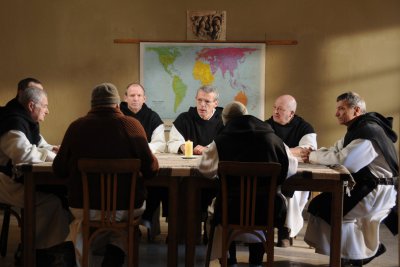Reviews - Of Gods And Men
Of Gods And Men
Reviewed By John Stakes

Of Gods And Men
There have been many films depicting the strength of religious faith when tested under extreme conditions. The Club’s 2010 screening of Mugabe and the White African for example concerned the almost superhuman power of faith to drive the Campbell family on in their quest for justice in the face of oppression in Zimbabwe.
Last Sunday’s screening of French director Xavier Beauvois’s 2010 Cannes Grand Prix winner Of Gods and Men centred on the courage of an eight member cloister of Trappist monks in the Atlas mountain region of Algeria to remain resolutely passive and politically neutral in the face of oppression from Muslim extremists in the mid 1990s.
In Beauvois’s film two diametrically opposed aspects of religious faith came under scrutiny: that of the Muslim fundamentalist oppressor and that of its Christian victim, the film focusing on the plight of the latter. The fate of the Trappist monks lay in the film’s title which was taken from a passage in the Book of Psalms which declares pessimistically and prophetically “ye are of Gods and children most high: but ye shall die like men and fall like one of the princes”
The background to the slaughter in 1996 by beheading of seven of these Cistercian monks lay in the events following Algerian Independence (from France) in 1962. The military Government had initially asserted state control over religious activities which initially tolerated and protected minority religious groups from oppression from Muslim fundamentalists. The growth in extremism arose because many Muslims were not satisfied with the state of their nation and pressed for a more dominant role in the legal and political process. They opposed what they saw as decadent western practices in social and cultural life (will they ever embrace freedom of speech one wonders?). By the mid 1980s Algeria was facing civil war.
The monks’ dilemma was that they had quietly and effectively contributed to the well-being of the local deprived community at the same time pursuing their cloistered ways including vows of silence and centuries-old beliefs. The crusty elderly Luc is a doctor who holds surgeries for the villagers who in turn have accepted this religious order into their community. “We are the birds – you are the branch”.
Into their midst one Xmas Eve, some weeks before issuing an ultimatum requiring all foreigners to leave, and having already slain migrant Croatian construction workers and moderate imams, a band of Muslim extremists come knocking, seeking not mayhem but medicine from the Monastery. Abbott Christian refuses them entry into “this place of peace” solely, and not unreasonably, because they are armed and declines to negotiate.
The monks’ fate is sealed when they lose the protection of the armed forces who have interpreted their willingness to apply the Hippocratic oath to all in their community as collaboration with the enemy. They choose to remain when many would say common sense dictated they should leave. Why stay is the film’s core issue?
The explanation is founded not so much in an unshakeable belief that God will deliver them from evil but rather in their acceptance of the transient nature of human life which they see as being overseen by a God to whom they have already previously given their lives and drunk from “the chalice of passage”. And, in mortal terms, this is their home where they belong to do God’s work. To leave would be cowardice. After much soul-searching they accept their fate but not without deep-rooted fear.
These events are covered in a slow measured way which captures not only the gentle pace of their earthly existence and life in the community but also their identification with the spiritual. When the camera ventured outside, the monastery’s inner peace was immediately shattered.
Rarely has the nature of religious faith been examined with such respect and integrity. As the monks’ faith was tested it was as if Divinity itself was on trial. The film eschewed any attempt to create artificial tension and drama. The inevitability of their fate is followed through their adherence to their everyday life and rituals leading to a memorably moving last supper denouement before they are taken outside to their deaths in the snow covered woods. Unlike the equally inevitable climax of Katyn we are spared their gruesome demise.
This haunting, memorable and moving film has deservedly picked up several other high ranking international awards and was particularly appreciated by another large Keswick audience which ranked it amongst the very best of a hugely varied season. It deserves to be seen by everyone.
Last Sunday’s screening of French director Xavier Beauvois’s 2010 Cannes Grand Prix winner Of Gods and Men centred on the courage of an eight member cloister of Trappist monks in the Atlas mountain region of Algeria to remain resolutely passive and politically neutral in the face of oppression from Muslim extremists in the mid 1990s.
In Beauvois’s film two diametrically opposed aspects of religious faith came under scrutiny: that of the Muslim fundamentalist oppressor and that of its Christian victim, the film focusing on the plight of the latter. The fate of the Trappist monks lay in the film’s title which was taken from a passage in the Book of Psalms which declares pessimistically and prophetically “ye are of Gods and children most high: but ye shall die like men and fall like one of the princes”
The background to the slaughter in 1996 by beheading of seven of these Cistercian monks lay in the events following Algerian Independence (from France) in 1962. The military Government had initially asserted state control over religious activities which initially tolerated and protected minority religious groups from oppression from Muslim fundamentalists. The growth in extremism arose because many Muslims were not satisfied with the state of their nation and pressed for a more dominant role in the legal and political process. They opposed what they saw as decadent western practices in social and cultural life (will they ever embrace freedom of speech one wonders?). By the mid 1980s Algeria was facing civil war.
The monks’ dilemma was that they had quietly and effectively contributed to the well-being of the local deprived community at the same time pursuing their cloistered ways including vows of silence and centuries-old beliefs. The crusty elderly Luc is a doctor who holds surgeries for the villagers who in turn have accepted this religious order into their community. “We are the birds – you are the branch”.
Into their midst one Xmas Eve, some weeks before issuing an ultimatum requiring all foreigners to leave, and having already slain migrant Croatian construction workers and moderate imams, a band of Muslim extremists come knocking, seeking not mayhem but medicine from the Monastery. Abbott Christian refuses them entry into “this place of peace” solely, and not unreasonably, because they are armed and declines to negotiate.
The monks’ fate is sealed when they lose the protection of the armed forces who have interpreted their willingness to apply the Hippocratic oath to all in their community as collaboration with the enemy. They choose to remain when many would say common sense dictated they should leave. Why stay is the film’s core issue?
The explanation is founded not so much in an unshakeable belief that God will deliver them from evil but rather in their acceptance of the transient nature of human life which they see as being overseen by a God to whom they have already previously given their lives and drunk from “the chalice of passage”. And, in mortal terms, this is their home where they belong to do God’s work. To leave would be cowardice. After much soul-searching they accept their fate but not without deep-rooted fear.
These events are covered in a slow measured way which captures not only the gentle pace of their earthly existence and life in the community but also their identification with the spiritual. When the camera ventured outside, the monastery’s inner peace was immediately shattered.
Rarely has the nature of religious faith been examined with such respect and integrity. As the monks’ faith was tested it was as if Divinity itself was on trial. The film eschewed any attempt to create artificial tension and drama. The inevitability of their fate is followed through their adherence to their everyday life and rituals leading to a memorably moving last supper denouement before they are taken outside to their deaths in the snow covered woods. Unlike the equally inevitable climax of Katyn we are spared their gruesome demise.
This haunting, memorable and moving film has deservedly picked up several other high ranking international awards and was particularly appreciated by another large Keswick audience which ranked it amongst the very best of a hugely varied season. It deserves to be seen by everyone.
Find A Film
Search over 1500 films in the Keswick Film Club archive.
Friends
KFC is friends with Caldbeck Area Film Society and Brampton Film Club and members share benefits across all organisations
Awards
Keswick Film Club won the Best New Film Society at the British Federation Of Film Societies awards in 2000.
Since then, the club has won Film Society Of The Year and awards for Best Programme four times and Best Website twice.
We have also received numerous Distinctions and Commendations in categories including marketing, programming and website.
 Talking Pictures
The KFC Newsletter
Talking Pictures
The KFC Newsletter
Links Explore the internet with Keswick Film Club


